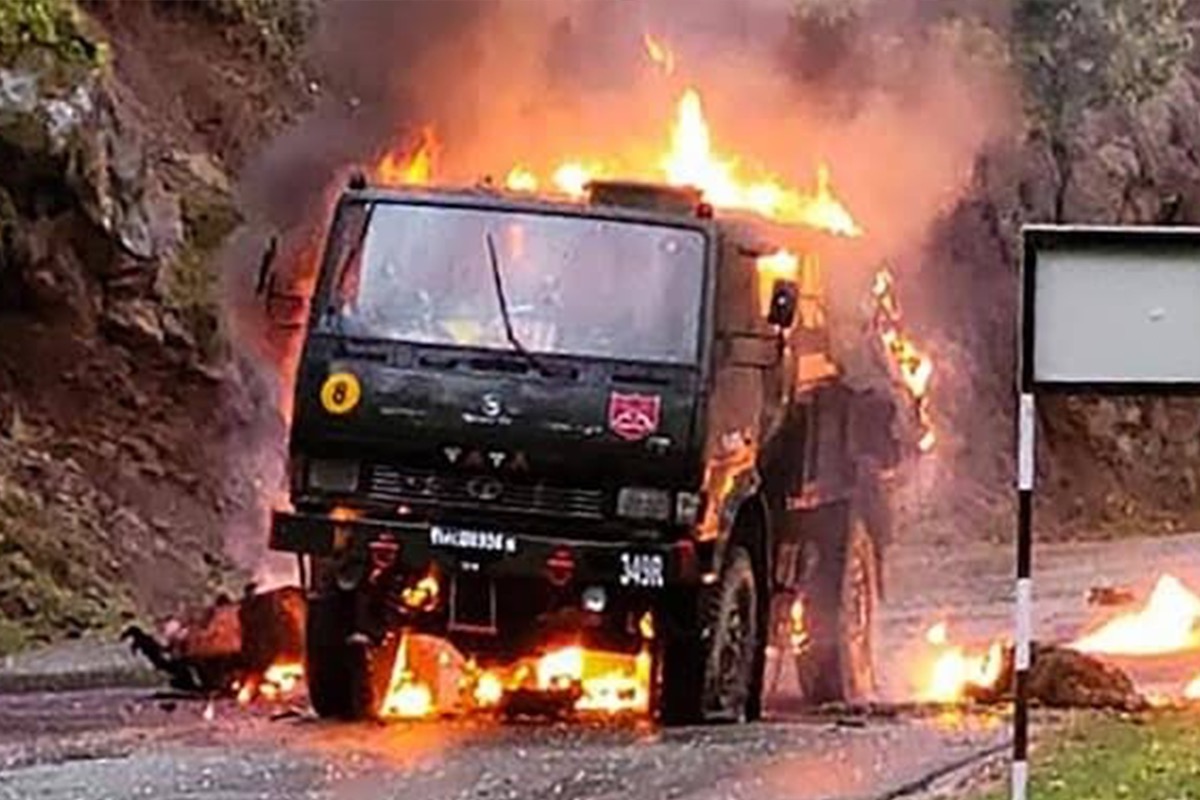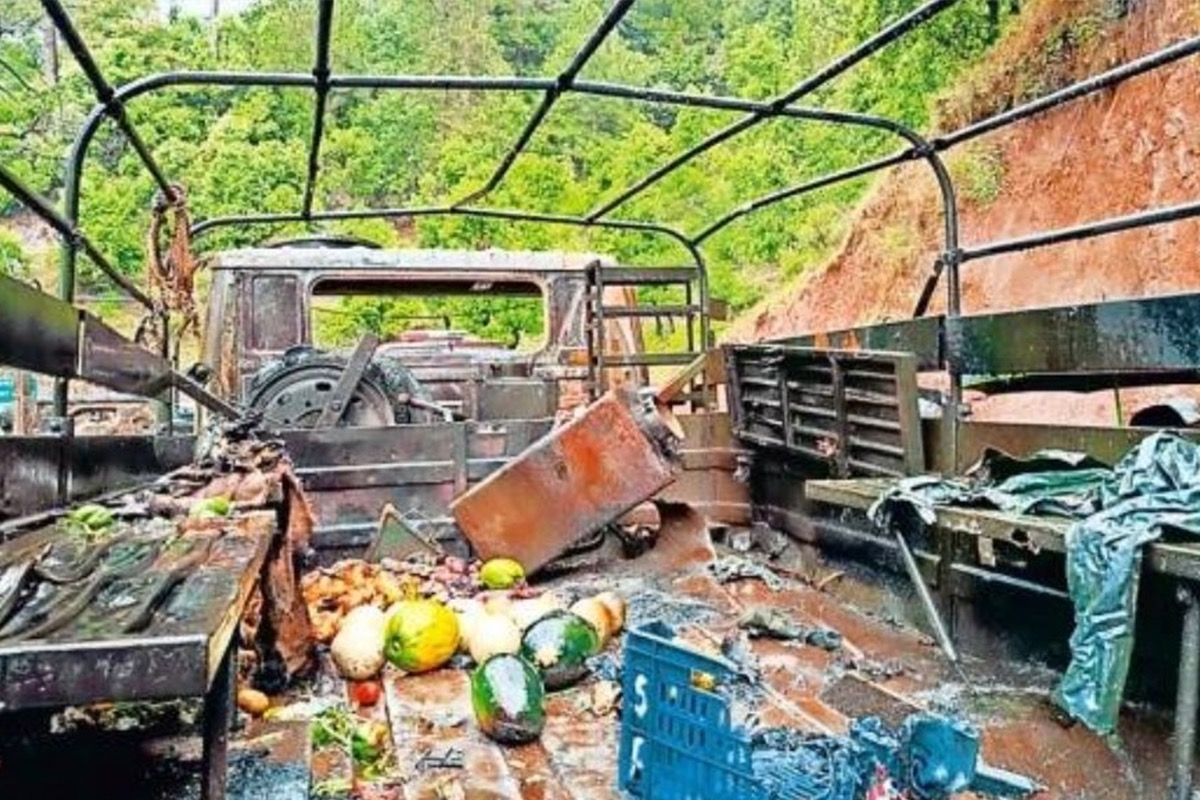
Since India has the advantage now of choosing the place, time, or the mode, the options are many. Breakaway provinces (KPK, the Durand ‘zone’, Baluchistan, G-B), civil unrest, Punjabi racism, economic turmoil – it is almost an open season with the right kind of intent and strategy.

The Incident
On the afternoon of April 20, a few kilometres from the LoC in Indian territory, six Rashtriya Rifle jawans were ambushed, shot at with assault rifles and rocket propelled grenades. This happened when an army truck (carrying food and refreshment for an iftar party in their barracks) was passing through a dense forest area in Poonch district. An estimated between three to seven terrorists belonging to a combined team of Jaish e Muhammad (JeM) and Lashkar e Taiba (LeT) hiding in the forest trapped the solitary vehicle and opened fire. Five of the soldiers died; the last one among them presently battles for his life in a hospital.
Though there is an extensive investigation going on along with an active manhunt for this combined group of Pakistani and local terrorists, who greenlit the attack is a foregone conclusion. Despite its economic woes, terrorism remains Pakistan’s chief export – its cottage industry service to the neighbourhood. The present incident is most likely a step after their expressed anguish over India presenting Jammu and Kashmir (J&K) as one of the destinations for its G20 meeting series.
The Reasons
As for the reasons behind stepping this up beyond the usual rhetoric, there are two. The first reason is tactical. A terror incident could help restore the image of J&K as a conflict zone and that in turn might help lend the impression that New Delhi could be hiding something while telling the world that it is business as usual in J&K. That in turn might lend Pakistan some badly needed credibility on their Kashmir narrative. There are updates already about the fact that these terrorists are probably not fresh infiltrators and that they have been hiding in Kashmir for some time. That will help tilt the balance towards ‘local men resent the Indian army’ narrative.

The second reason is existential. To witness normalcy having returned to J&K as Pakistan slides deeper and deeper into an abyss could be a terrible certainty to process. Truth be told, Pakistan is in a spot. There is a looming political and an economic crisis that have the elements of a civil war. The armed secessionist movement in Baluchistan has become active again. The Afghan Taliban keeps violating the Durand Line. The Tehrik-e-Taliban Pakistan (TTP) has a virtual autonomy in the KPK Province; Pakistan government laws do not apply there anymore. There is a sudden uptick of secessionist activism among the Gilgit Baltistan population – a large section of them wants to reunite with India. With life returning to normal in J&K with the Tricolour fluttering over Lal Chowk in the place of the Pakistani flag kind of completes the dystopia for Rawalpindi.
The Question
With so much on their plate, does Pakistan reserve the bandwidth to act solo?
The logical answer is that it does not. There has to be an external prompt; an incentive or a quid pro quo, most certainly promised to Rawalpindi. And my guess is that this is not China. Ever since the ouster of Imran Khan and the army coming back in the driver’s seat, Pakistan has moved closer to its old master of the Cold War era. Though China still remains involved in the existing projects related to CPEC – the investments have nearly stopped, the ‘all-weather friendship’ looks under the weather as destiny pushes Pakistan back into the folds of its past as the West’s cat-paw in the Asian heartland.
Across the border, New Delhi has been having it a little tricky since the time India decided to stay neutral in the Russo-Ukraine conflict and subsequently continued trading with Russia. BBC attacking PM Modi, short sellers from USA attacking leading Indian business houses, international political non-entities like Germany expressing concerns over Indian democracy, orchestrated chaos by ‘visiting’ Khalistani terrorists, organised attacks on Hindu NRIs residing in the UK, constant efforts to undermine the G20 proceedings (here, here, and here), these are all part of the same game. And the game is about ensuring one of two things: the removal of PM Modi in 2024; or, disallowing him even the slightest of wriggle room in case he wins the election and returns to power.
The Response
The perpetrators – and I do not mean JeM or LeT – know quite well that New Delhi would not respond to the Poonch terrorism reflexively. There is a prestigious conference series that India is responsible for; peace, balance and good PR, not muscle flexing, is a priority. Besides, this is the month of Ramzan and Eid; a Balakot type response to Pakistan might not sit well with some of the Muslim members of the G20.
Since India has the advantage now of choosing the place, time, or the mode, the options are many. Breakaway provinces (KPK, the Durand ‘zone’, Baluchistan, G-B), civil unrest, Punjabi racism, economic turmoil – it is almost an open season with the right kind of intent and strategy.
Finally, one expects this incident to be treated as a lesson. Ever since Pakistan’s economic crisis, a section of the Indian commentariat, apparently consumed by a wave of sympathy and brotherhood, have been trying in their own ways to reach out to the BJP government through the social media, trying to influence the PMO to support Pakistan financially and otherwise. Let the Poonch terror attack of 2023 be an indicator about Pakistan’s priorities and approach – a reference point for doubt removal within the government decision-making process.
(Arindam Mukherjee is a geopolitical analyst and the author of JourneyDog Tales, The Puppeteer, and A Matter of Greed.)
The views expressed are the author’s own.